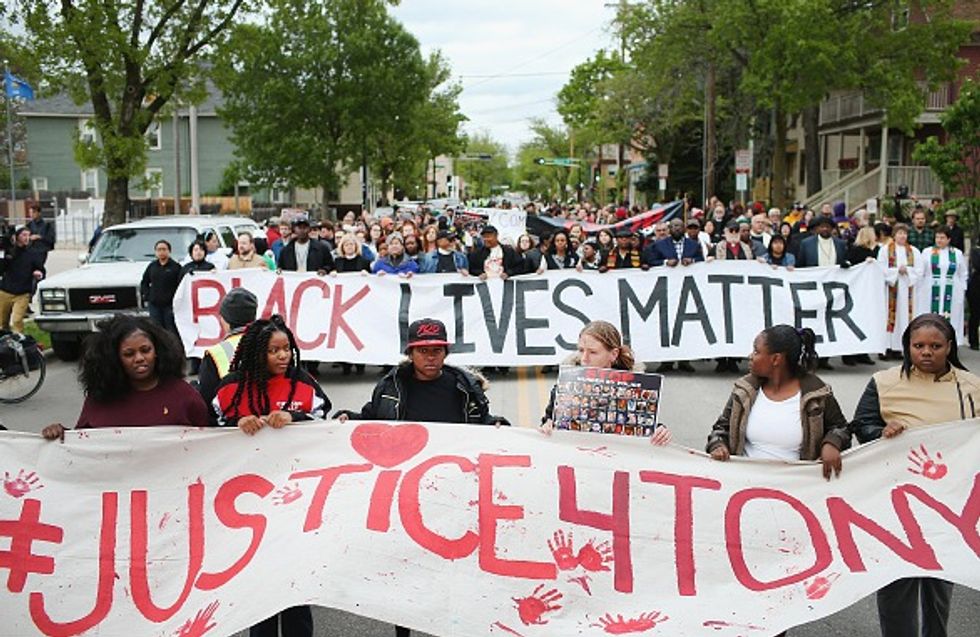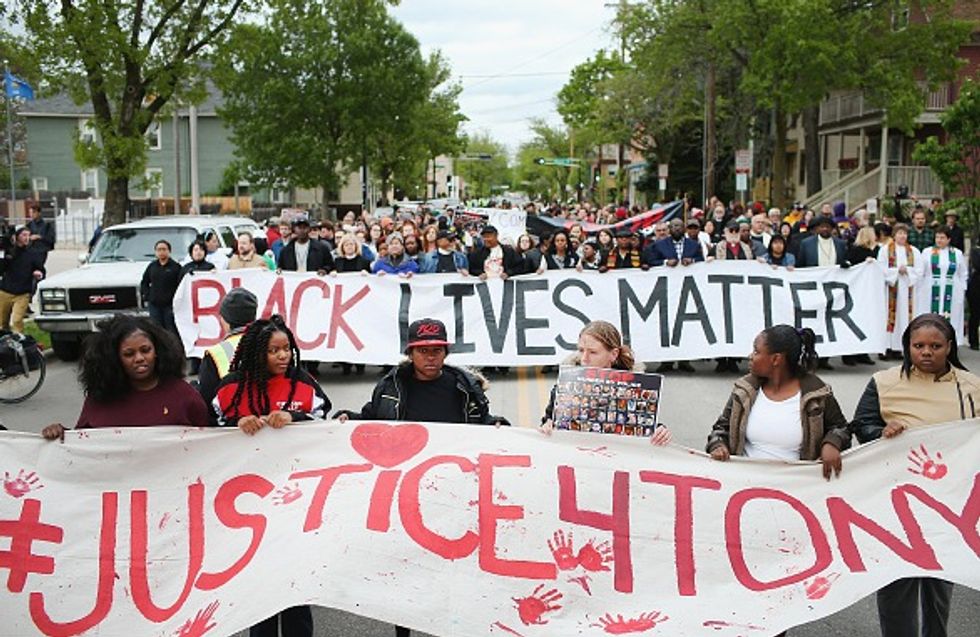I grew up thinking it was a no-brainer.
No qualifier, no asterisk, no nothing. A human is a human is a human.
But last Tuesday, as I watched presidential candidates asked to actually choose between “Black Lives Matter” and “All Lives Matter,” I realized that it’s not that simple anymore.
To an increasing number of people, saying that “All Lives Matter” in the context of the “Black Lives Matter” movement is offensive, insensitive, naïve and blind.
I’m flabbergasted — “all lives” doesn’t obviously include black lives?
For many, it’s just not that simple.
So what gives?
What makes 'All Lives Matter' so offensive?
Let me set up the frame of mind:
 Image source: chainsawsuit.com
Image source: chainsawsuit.com
In this view, “All Lives Matter” means it’s irrelevant if one community of people is struggling; we can’t pay any more attention to that group than to any other. Further, it’s “obvious that white people matter” and “people don’t need to be reminded,” says the Daily Free Press.
(By the way, for this cartoon’s premise to be true, then the guy should be spraying water on both houses exactly equally. Instead, he’s smugly spraying it on a house that doesn’t need it, while ignoring the problem — ultimately communicating the idea that All Lives Matter is openly and gleefully prejudice.)
And under this premise, the supposed thoughtlessness of “All Lives Matter” becomes clearer.
But here’s the problem:
No one — absolutely no one — is suggesting that we entirely ignore a group of people for the sake of “equally” paying attention to the whole. It’s also not exclusively about white lives versus black lives. (That's an assumption.)
What’s being challenged is the idea that some can call for recognition of their lives, while demeaning others in the process.
If it’s about the value of all black life, then:
Where’s the movement in response to the staggering loss of black life in cities like Chicago?
Where’s the movement when it comes to abortion, which has taken the lives of 16 million black babies in the past forty years alone?
If it’s not about devaluing other lives in the process, then:
Where is Black Lives Matter leadership when activists call for “open season on killing white people and crackers”?
Where is Black Lives Matter leadership when activists call for police to be “fried like bacon”?
Where are the calls decrying the glorification (and inclusion in Black Lives Matter training materials) of convicted cop killer and FBI-designated terrorist Assata Shakur?
Where are the Martin Luther King Jrs. of this movement, calling for all mankind to be judged by the “content of their character and not the color of their skin”?
In the deafening silence that answers those questions, you’ll forgive me for being leery of this movement’s motives and feeling the need to point out that — in the face of calls for my death — that my life matters, too.
Any effort purportedly seeking positive change gets nowhere so long as there is a steady undercurrent of what is ultimately revenge.
The African-American community is in trouble — and it’s thanks to institutionalized racism. (Or is it?)
A driving force behind Black Lives Matter is the concept that racism is institutionalized. Racism, then, is the driving force behind the hardships African-Americans face.
Democratic presidential candidate Vermont Sen. Bernie Sanders said that “Black Lives Matter” is significant because “the African-American community knows that on any given day some innocent person like Sandra Bland can get into a car, and then three days later she’s going to end up dead in jail.”
The Bland case aside, it's true, the African-American community is in serious trouble:
● 1 in 3 black males will go to prison in his lifetime.
● 72 percent of black children are born into broken families.
● Blacks “are about twice as likely as whites” to use welfare at some point in their lives.
● Black unemployment far outpaces the national average; the black poverty rate (up several points under Barack Obama, ironically) sits at 27.2 percent.
So is it institutionalized racism that is keeping black Americans down and under the thumb of a largely bigoted law enforcement and criminal justice system?
And remember, the question isn’t whether or not there was, or is racism; or whether its effects are negative (they are).
 Scott Olson/Getty Images
Scott Olson/Getty Images
The question is: Can we blame it conclusively for the problems?
Or, should we — in the quest of intellectual honesty — consider other causes, too, like the welfare state that has existed hand-in-hand with the decline of the African-American community?
The easy path is to say I’m somehow calling African-Americans lazy freeloaders.
The easy path is to challenge my having entered this conversation in the first place, given my race and so-called privilege.
The easy path is to say we white people don’t get to “decide what is or isn’t racist because we don’t actually experience racism,” which is categorically untrue, by the way. Racism is hatred by any person for any person based solely on race. And that’s not me — that’s the English language. We don’t get to redefine language or re-categorize hate so that it fits a narrative. But I’ve digressed.
I’m challenging you to think critically about this.
The harder conversation to have is one that takes into consideration all causes and effects. In this case, living for generations on some form of welfare (which our government has specifically encouraged and facilitated in the African-American community since the dawn of the War on Poverty), destroys a person. It becomes, as President Franklin Delano Roosevelt once said, “a narcotic and a subtle destroyer of the spirit."
You want to blame white America for this problem? Be my guest — to an extent. After all, was it not largely white progressives who created, promoted, and institutionalized the idea that disadvantage can be addressed through government?
And if you won’t or can’t listen to me on the matter because I’m white, then I’ll defer to Thomas Sowell, who once said of the War on Poverty’s devastating effect, “the black family, which had survived centuries of slavery and discrimination, began rapidly disintegrating in the liberal welfare state that subsidized unwed pregnancy and changed welfare from an emergency rescue to a way of life.”
Dependency breeds a dulled sense of personal accountability, destroys a drive to excel and has a propensity for sending a person into a spiral of frustration, hopelessness and anger. And this isn’t unique to any one race — look at the tragic state of many American Indians in reservation-welfare hell.
It’s this frustration, hopelessness and anger that lead many to believe racism hasn’t made a step since Jim Crow and to use as a justification for illicit behavior.
All that said, let’s momentarily accept the premise that racism is largely to blame.
Morally speaking, does it excuse the crimes that have placed so many in prison?
It’s not a comfortable concept, but no — one form of immorality doesn’t excuse another. And it doesn’t preclude the offender (of any race) from consequence. One’s race does not make a crime any more or less criminal.
As fellow contributor Matt Walsh put it:
No matter how often it happens, it will always boggle my mind that anyone could site these figures about blacks getting shot by cops without even mentioning that a large number of them were engaged in shoot-outs prompted by their decision to commit a crime.
When behavior is excusable because circumstances are unfair — then ultimately, anything goes, and consequences are understandably unjust.
And the vicious circle continues.
Where does it ultimately end? And how could it possibly ever be fixed?
So yes, Black Lives Matter has a point: The African American community is in big trouble. But it’s not a one-dimensional problem.
If you walk away with nothing else from this discussion, walk away with these two things:
First, no matter the problem, no life can be truly valued, protected and improved unless all life is valued on the same level — out loud. Does this mean all problems sit on the same level? Absolutely not — but each and every life does. Double standards (i.e. “white people don’t get to talk about how their lives matter, too”) do not breed solutions — they breed hate, divisiveness and destruction.
Second, and just as important, no wrong can be corrected with another wrong. If hate’s the problem, it’s not solved with more hate. Ever.
“All Lives Matter” (which includes black lives) isn’t thoughtless. It’s not insensitive, naïve, or racist.
It’s vital.
Mary Ramirez is a full-time writer, creator of www.afuturefree.com (a political commentary blog), and contributor to The Chris Salcedo Show (TheBlaze Radio Network, Saturday, from noon to 3 p.m. ET). She can be reached at: afuturefree@aol.com; or on Twitter: @AFutureFree
–
TheBlaze contributor channel supports an open discourse on a range of views. The opinions expressed in this channel are solely those of each individual author.


 Image source: chainsawsuit.com
Image source: chainsawsuit.com
 Scott Olson/Getty Images
Scott Olson/Getty Images


